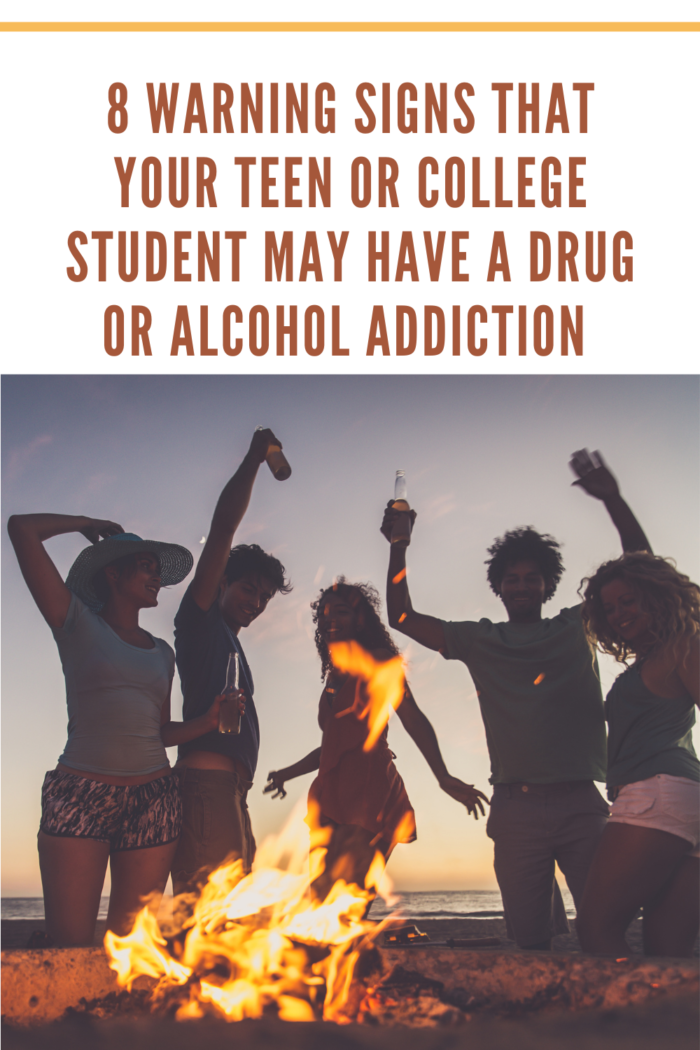If you’re worried that your teen or college student may have a drug or alcohol dependency problem, it’s a good idea to know what warning signs to watch out for.
When your child is showing several signs, it’s a good idea to talk to them in a comforting manner to discover whether they have an addiction problem. Together, you can then tackle the problem.
Recognizing Red Flags: Indicators of Substance Abuse in Adolescents and College Students
So, here are eight signs that you should be aware of.
-
Changes in Mood
One of the first warning signs to look out for is mood changes. For example, you might notice that your teen or college student has become increasingly irritable, anxious, or distant.
If these shifts in demeanor persist and are unexplained by other factors, such as stress or relationships, it could potentially indicate an underlying addiction.
-
Declining Academic Performance
If your child’s grades start to plummet without explanation, this could signify a growing problem. Keep an eye on their academic performance, particularly if they’ve historically been successful in school.
Struggling with homework, missing deadlines, and a general disinterest in learning may possibly be red flags pointing toward drug or alcohol abuse.

-
Isolation and Withdrawal
As substance abuse progresses, social withdrawal is common. If your teen or college student begins to isolate themselves from family and friends, spending time alone more often than usual, this could be a sign of addiction taking hold.
-
Changes in Relationships
An individual struggling with addiction might exhibit drastic shifts in their friendships.
For example, distancing from old friends while forging new connections with peers who enable their substance use can indicate a growing issue.
-
Deterioration of Physical Appearance
A visible warning sign to watch for is the decline in physical appearance.
For example, if your kid starts neglecting personal hygiene and grooming, loses weight rapidly, or shows signs of unexplained bruising, these could be indications of drug or alcohol addiction.
-
Health Issues
Addictive behaviors may manifest as chronic health problems. Examples include frequent headaches, nausea, or frequent colds and infections.
If your child’s general health is deteriorating without any reasonable explanation, it’s crucial to consider addiction as a potential cause.
-
Unusual Sleep Patterns
An addiction can take a toll on an individual’s sleep schedule.
If you notice that your teen or college student is sleeping either too little or too much without any clear reason, it might signal an underlying issue with substances.
-
Financial Irresponsibility
Teens and college students grappling with addiction often struggle financially due to their need to fund the habit.
Consequently, they may frequently ask for money without justification or even resort to stealing.
Seeking Treatment for Your Teen or College Student
Recognizing and addressing a potential addiction in your teen or college student is essential in helping them to overcome their dependency.
By offering support and understanding their struggles, you’ll be better equipped to guide them toward recovery in the right way.
There are several treatment options available for young adults dealing with drug and alcohol addictions. Finding the most suitable one for your child’s needs is critical.

Inpatient Treatment Centers
Inpatient treatment centers offer a structured environment where patients can receive professional care around the clock.
For instance, as Indiana’s recovery facility for drug and alcohol addictions, Fort Wayne Recovery provides evidence-based therapies to address underlying issues contributing to substance abuse.
Outpatient Programs
Outpatient programs are another viable option, particularly if your teen or college student cannot take extended breaks from their daily life.
These programs allow young adults to attend treatment sessions several times a week while maintaining their usual routines.
Support Groups and Therapy
Support groups such as Alcoholics Anonymous or Narcotics Anonymous can provide invaluable peer support throughout the recovery process.
Additionally, individual therapy options like cognitive-behavioral therapy or family counseling may be recommended depending on your child’s circumstances, explains the MayoClinic.
